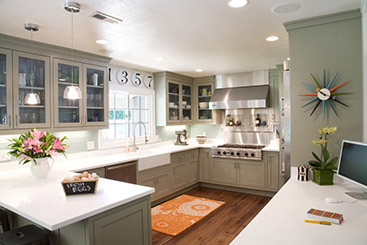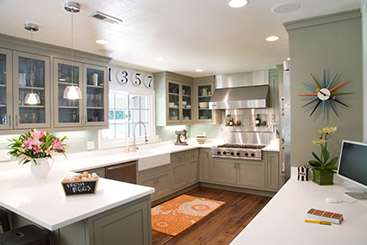How To Calculate Drawer Spacing

It's not difficult to measure for cabinet drawer boxes. There are two keys to getting the job done right: overlay and hardware. You'll find a helpful guide to getting the correct measurements below, but the best thing you can do to ensure your drawer boxes are the right size is to check your hardware specs.
After you've consulted the installation instructions for the hardware you plan to use, the first consideration is drawer overlay, which refers to how much your drawer fronts should overlap the cabinet end panels or face frames. If they shouldn't overlap at all, you want inset fronts. You need to know whether you have overlay or inset drawer fronts to calculate your drawer depth. Inset fronts generally require slightly shallower drawer boxes.
The second thing you need to think about before ordering drawers is the hardware you plan to use. Drawer hardware comes in two basic types:
- Side-mount slides attach to the sides of your drawer boxes. You'll be able to see these slides when the drawer boxes are open. You can get side-mount slides in ¾ or full extension, which refers to how far the drawer boxes pull out of the cabinets. Most side-mount slides require 1/2" to 17/32" of clearance on each side of a drawer. That means each drawer should be 1" to 1-1/16" smaller than the opening to fit properly.
- Under-mount slides attach to the bottoms of drawer boxes and can't be seen when the drawers are open. They're quite a bit more expensive than most side-mount slides and usually have lots of side-to-side and up-and-down adjustments. Under-mount slides require 3/32" - 5/32" of clearance of each side of your drawers to work correctly. Your drawers should be 3/16" - 5/16" narrower than their openings.
Let's assume you want to order a drawer box for a face frame cabinet with a 6" tall, 18" wide opening. Your cabinet is 24" deep. You'll have a half-overlay front that measures 7" x 19". The size of the drawer front really doesn't matter, but it's here to help you understand what half-overlay means.

You know the opening size. Now you need to know what hardware you'll use. Let's go with side-mount KV 8400 slides. If you look at the installation instructions, you'll see that your drawer should be 1" narrower than the width of the cabinet opening, or 17".
Because a 24" deep cabinet will have an interior depth that's slightly less than that dimension, your drawer slides need to be smaller, too. KV's installation instructions show that the next size down from 24" is 22", so that's your slide length and drawer depth.
Allow at least 1/4" of clearance above and below the drawer, giving you a height of 5-1/2" (6" minus 1/4" at top and 1/4" at bottom). Your drawer box should be 17" wide, 5-1/2" tall and 22" deep.
The main thing you should take away from this article is that the only fool-proof way to measure drawer boxes correctly is to consult the specs or installation instructions for the hardware you plan to use. With that disclaimer out of the way, here's a cheat sheet to drawer boxes and hardware:
- Drawer boxes for side-mount slides should be 1" - 1-1/16" narrower than the opening. The larger dimension will give you a little room to adjust the slides if necessary.
- Drawer boxes for under-mount slides need to be 3/16" - 5/16" narrower than the opening, depending on the thickness of the drawer material. Sorry, but you'll have to consult the specs for details. Take a look at Blum under-mount slides.
- If you're going to use under-mount slides, you'll want to have notches put in the backs to accommodate the hardware.
How To Calculate Drawer Spacing
Source: https://www.cabinetnow.com/how-to/measuring-for-cabinet-drawers/
Posted by: davisbantais.blogspot.com

0 Response to "How To Calculate Drawer Spacing"
Post a Comment